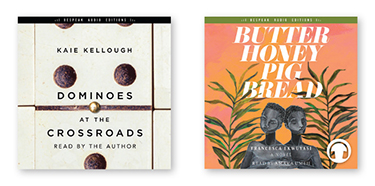LJ Talks to ECW Press
LJ chatted with the team at ECW Press—Audiobooks Manager Cassie Smyth, Co-Publisher and President David Caron, and Digital Marketing Associate Anita Ragunathan—about narrators, titles, and all things audio.
LJ chatted with the team at ECW Press—Audiobooks Manager Cassie Smyth, Co-Publisher and President David Caron, and Digital Marketing Associate Anita Ragunathan—about narrators, titles, and all things audio.
 Please share about ECW Press. How did you get started? What defines you as a publisher?
Please share about ECW Press. How did you get started? What defines you as a publisher?
CS: While ECW was originally founded in 1974, we really began our dive into audiobook production in 2015. Since then, we’ve produced more than 500 audiobooks and are currently producing more than 120 audiobooks each year. It is our aim to bring the best of contemporary Canadian literature in audiobook form to readers around the world.
DC: In general, we want to see our books be accessible to readers in formats that work best for them. We’re certified by Benetech as a Global Certified Accessible Publisher.
AR: What I love about ECW audio is the Bespeak imprint and its mandate of bringing diverse Canadian books and voices to the world. I started at ECW in 2019 and was thankful to be able to work with audiobooks. The audiobooks team at ECW is truly wonderful.
Tell us how you find narrators and pair them with the right books.
CS: Each production is unique, and our search for a perfect narrator or narrators reflects that. During the beginning stages, we ask authors and editors what they’re looking for in a narrator. This could include age range, gender identity, vocal range, accent, knowledge of languages other than English, or anything else they feel is important to keep in mind when choosing the perfect narrator. We encourage them to tell us as much as possible so we can find a narrator with all the right skills. At all times, we are making notes on who could potentially be a great narrator. Once we’ve determined the casting criteria, I put out an open call for auditions and also ask for reads from those who could be the right narrator for the book. Then I review submissions before running a shortlist by the creative team and selecting a top contender.
How do you choose books that become successful audiobooks?
DC: When we started our Bespeak series, we got [150] responses to the same question: If you could choose five books that you thought were the best in contemporary Canadian literature, what would they be? Those responses have proven invaluable to the titles we have chosen to publish. We have published newer titles, of course, but that’s the criteria: We have to believe that those new titles will stand well alongside these great others.
AR: This might sound self-centered, but I pitch the team audiobooks based on what I want to hear in audio. I have two primary interests: social sciences and poetry, two categories that are not well represented in audio. Before I came on board, Bespeak had produced Policing Black Lives by Robyn Maynard, which was essential to my understanding of anti-Blackness in the Canadian context. As an auditory learner, it’s important for me to have access to this material, and so when I’m reading books like On Property by Rinaldo Walcott, which we produced, or Storying Violence by Gina Starblanket and Dallas Hunt, I ask myself [if for some], “Would this material be easier to digest in audio?” and often the answer is yes. Poetry, on the other hand, is so powerful in its ability to distill everything from the mundane to the profound. We recently produced Book of Wings, a novel by the poet Tawhida Tanya Evanson that explores the decaying of a romantic relationship. I wept while listening to the moving narration of Athena Karkanis.
Looking back, what are some of the productions that you are most proud of? Why?
CS: This question is a lot like asking a parent to pick a favorite child! I would say that I’m exceptionally proud of any production where everything just clicked into place. Fenian Street by Anne Emery, narrated by Jamie Cavanagh, comes to mind because the narrator nailed the accents and delivered the character voices exactly as the author had imagined them. This question also makes me think of productions like The Education of Augie Merasty, written by Joseph Auguste Merasty with David Carpenter and narrated by Lorne Cardinal. The narrator took such care and consideration to tell Augie’s story in a compassionate way, and that really comes through in the narration of this audiobook.
What challenges has ECW Press encountered in recent times?
CS: Much like the rest of the world, audiobook production has been affected by COVID. Because narrators rely on their voice to deliver a performance, we’ve had to reschedule and postpone recording dates when individuals have fallen ill. We work through these scheduling issues with compassion and flexibility while coming up with creative solutions to try to make up for lost time.
 Do you listen to audiobooks? What are some of your favorite listens?
Do you listen to audiobooks? What are some of your favorite listens?
CS: Of course! I’ve recently loved Dandelion, written by Jamie Chai Yun Liew and narrated by Jennifer Hui, and Dominoes at the Crossroads, written and narrated by Kaie Kellough.
DC: Morgan Hallett’s narration of The Clay Girl by Heather Tucker, an ECW book produced by Recorded Books, is captivating. I also found [our] Butter Honey Pig Bread [by Francesca Ekwuyasi, read by Amaka Umeh], a compelling listen, but I’m biased!
AR: I always have one (or several) audiobooks on the go! I’m currently listening to Sarah Polley’s Run Towards the Danger, a deeply introspective and vulnerable memoir that has pushed me to reexamine transformative experiences with compassion. The other audiobook I’m listening to is A People’s Guide to Capitalism by Hadas Thier, read by Jo Anna Perrin, which is an accessible guide to Marxist economics—wonderful for someone who has been trying to get past the first three chapters of [Marx’s] Capital for the last 15 years! And lastly, any book of poetry written and read by Mary Oliver is my go-to before bed.
ALREADY A SUBSCRIBER? LOG IN
We are currently offering this content for free. Sign up now to activate your personal profile, where you can save articles for future viewing









Add Comment :-
Comment Policy:
Comment should not be empty !!!